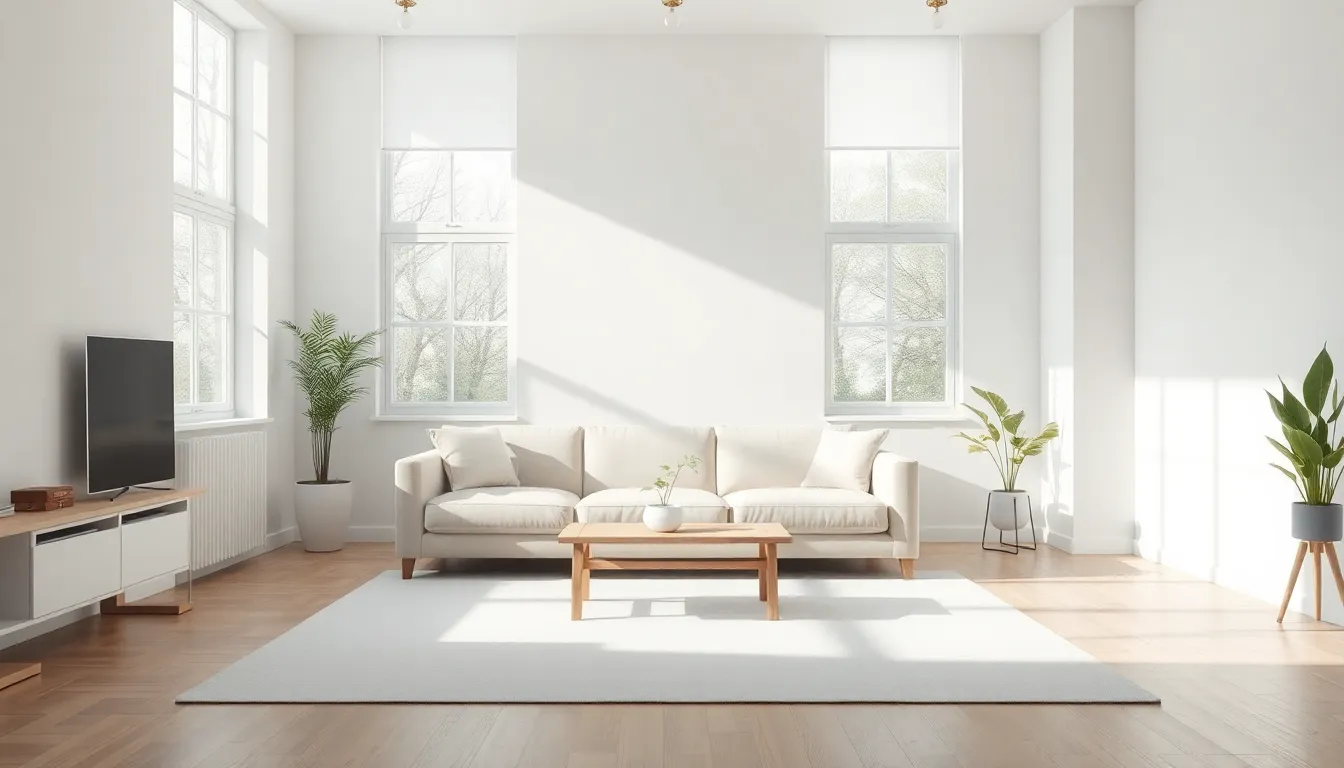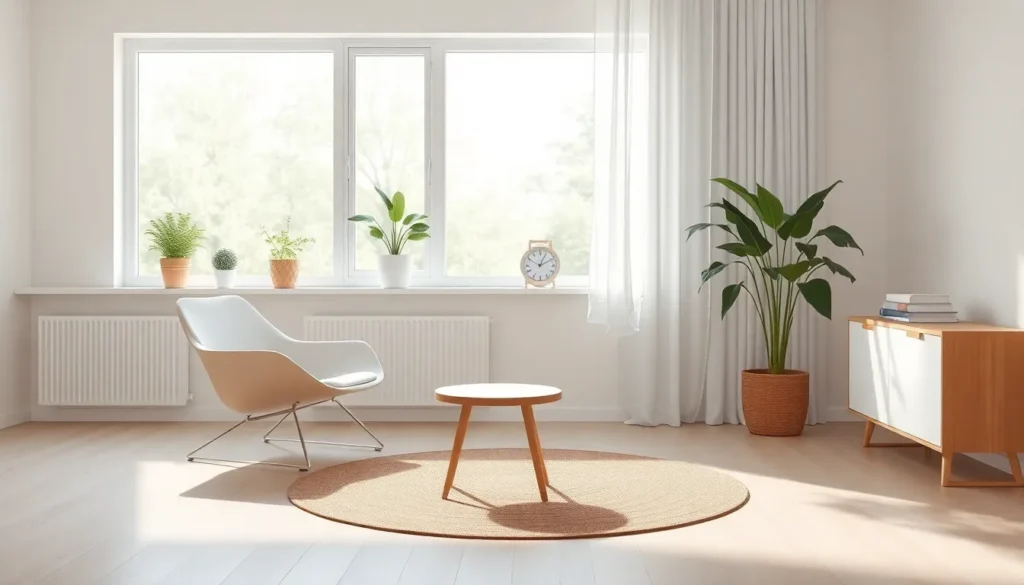In a world overflowing with stuff, minimalism offers a refreshing escape. Imagine living with just the essentials—fewer items, less clutter, and more space for what truly matters. It’s like decluttering your closet and your mind at the same time. Who wouldn’t want to swap a chaotic life for a serene one?
Benefits Of Minimalism
Minimalism emphasizes simplifying one’s life by focusing on essentials. This lifestyle encourages individuals to eliminate excess possessions and distractions. Physical clutter often leads to mental clutter, which can hinder productivity and peace. Living with less allows for greater clarity and intentionality in daily activities. Prioritizing meaningful experiences over material goods contributes to a more fulfilling life.
Choosing minimalism involves a commitment to reducing consumerism. Many people find that by eliminating unnecessary items, they create more space—both physically and mentally. Embracing this philosophy fosters an appreciation for what truly matters. Relationships, personal growth, and well-being take precedence over the accumulation of stuff.
Implementing minimalism requires mindfulness in consumption habits. Individuals need to evaluate their possessions and ask whether each item serves a purpose or holds sentimental value. By curating belongings carefully, they enhance their living environment. A cleaner space contributes to reduced stress and improved focus.
Overall, understanding minimalism involves recognizing its broader implications. It challenges societal norms surrounding success and material wealth. Simplifying one’s environment leads to increased creativity and a heightened sense of gratitude. Adopting this mindset can transform daily routines and interactions, ultimately fostering a meaningful existence.
Benefits of Minimalism

Minimalism offers numerous advantages that contribute to a more fulfilling life. By embracing simplicity, individuals can experience a sense of renewal in various aspects of their lives.
Enhanced Clarity and Focus
Minimalism cultivates clarity and focus by reducing distractions. It allows individuals to prioritize essential tasks over overwhelming clutter. A decluttered environment fosters improved concentration, enabling better decision-making. With fewer possessions, thoughts become clearer and more organized. Individuals often find it easier to engage in mindfulness practices, which enhances mental well-being. Increased clarity allows for deeper connections with meaningful ideas and relationships. Prioritizing quality over quantity in life leads to a greater sense of accomplishment and satisfaction.
Improved Financial Freedom
Financial freedom often results from adopting minimalism. Reduced consumption leads to lower expenses, as individuals focus on purchasing only necessary items. Savings grow as a direct result of mindful spending habits. With minimalism, individuals can redirect funds into experiences rather than material possessions. Reduced debt levels become achievable, fostering a healthier financial mindset. Financial burdens lessen as individuals prioritize long-term goals over immediate gratification. As consumption decreases, financial freedom creates opportunities for personal growth and investments in meaningful endeavors.
Increased Space and Organization
Embracing minimalism creates more physical space and promotes organization. Individuals find that fewer possessions lead to a more spacious and inviting environment. Enhanced organization simplifies daily tasks, making routines more efficient. Increased space encourages relaxation and inspires creativity, facilitating a tranquil living atmosphere. Maintaining an organized space boosts mood and reduces stress levels. Prioritization of personal belongings fosters appreciation and clarity in what truly matters. Ultimately, a minimalist environment nurtures both physical and mental well-being, leading to a harmonious lifestyle.
Emotional and Mental Well-Being
Minimalism profoundly impacts emotional and mental health, fostering clarity and peace. By adopting a minimalist lifestyle, individuals can cultivate a serene mind.
Reduced Stress and Anxiety
Less physical clutter leads to reduced mental clutter. Organized spaces contribute to clearer thinking, which diminishes stress levels. Studies indicate that simplifying possessions often correlates with lower anxiety levels. With fewer distractions, individuals can maintain focus on important tasks and goals. This shift allows for greater mindfulness in daily routines, promoting a more peaceful state of mind. Ultimately, embracing minimalism fosters an environment that reduces overwhelming feelings associated with excess.
Greater Appreciation for Simple Joys
Living minimally enhances appreciation for everyday experiences. Shedding unnecessary possessions opens up more room for meaningful interactions. Focus shifts from material possessions to cherished moments and relationships. Enjoying simple activities, such as a walk in nature or a conversation with friends, becomes more fulfilling. Research shows that minimalism often leads to a stronger sense of gratitude and happiness. Prioritizing what truly matters cultivates a deeper connection to life’s simple pleasures, enriching overall emotional well-being.
Practical Steps to Embrace Minimalism
Start by evaluating possessions. Identify items that no longer serve a purpose and set them aside for donation or recycling. Curating belongings fosters mindfulness, allowing time to reflect on what truly matters.
Next, focus on one area at a time. Tackle spaces like closets or drawers, making the process manageable and less overwhelming. Breaking tasks into smaller sections promotes success and encourages progress.
Consider implementing a “one in, one out” policy. This rule helps maintain balance by ensuring that acquiring new items requires parting with existing ones. Adopting this habit prevents future clutter.
Creating a minimalist workspace significantly enhances productivity. Limit distractions by keeping only essential tools and decor. An organized, simple environment encourages clearer thinking and better focus.
Practice mindful consumption. Before purchasing, question the necessity of each item. This approach cultivates financial discipline while prioritizing experiences over possessions.
Establish a routine for decluttering. Schedule regular sessions to assess belongings and eliminate unnecessary items. Consistency fosters a lifestyle of simplicity, reinforcing the principles of minimalism.
Incorporate minimalism into daily routines. Simplify meal preparations by planning weekly menus and choosing versatile ingredients. Streamlining activities creates space for meaningful interactions.
Connect with like-minded individuals. Join communities or groups that support minimalist values, fostering motivation and shared experiences. Engaging with others can provide inspiration and facilitate growth.
Conclusion
Embracing minimalism offers a transformative path to a more intentional life. By prioritizing essentials and letting go of excess, individuals can experience enhanced clarity and focus. This lifestyle not only fosters emotional well-being but also encourages financial freedom and creativity.
Minimalism shifts the focus from material possessions to meaningful relationships and experiences, nurturing a deeper appreciation for life’s simple pleasures. As one embarks on this journey, they may find that the benefits extend far beyond a tidy space, leading to a more fulfilling and serene existence. Ultimately, minimalism is about creating a life that truly reflects personal values and aspirations.

